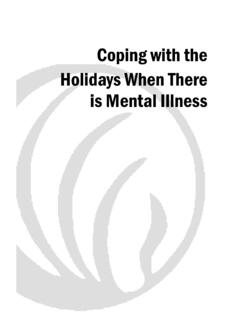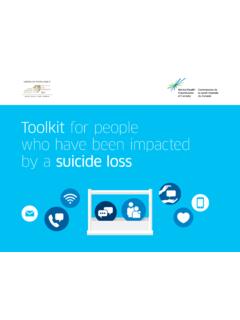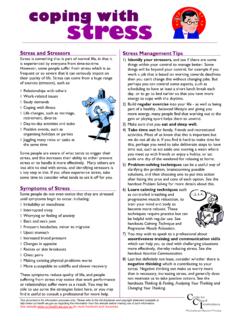Transcription of Group Workbook the Secret Map of Surviving Loss
1 The Secret Map of Surviving Loss 8 Week Workbook for Groups by For use with the Secret Map of Surviving Loss 2015 Elm Films. resources for grief healing for groups and individuals 1 TABLE OF CONTENTS INTRODUCTION 2 CHAPTER 1 EXPRESSING YOUR LOSS 3 CHAPTER 2 coping WITH HAUNTING IMAGES, GUILT AND POWERLESSNESS 4 CHAPTER 3 coping WITH SHOCK AND DIFFICULTY FUNCTIONING 7 CHAPTER 4 SECONDARY LOSSES 9 CHAPTER 5 IDENTITY 11 CHAPTER 6 SIGNS AND DREAMS 13 CHAPTER 7 coping WITH TRIGGERS 15 CHAPTER 8 MAKING MEANING 16 resources for grief healing for groups and individuals 2 INTRODUCTION This Workbook has been created for use with film the Secret Map of Surviving Loss. It contains written exercises to help members of your bereavement Group explore and express the feelings associated with your grief. The Workbook is broken into 8 chapters each corresponding with a chapter in the film. Chapter pages are designed to be copied and passed out to your Group as handouts.
2 You may decide you want your Group to watch the film chapter by chapter each week and work through the corresponding exercises, using sections of a film as a jumping off point for your Group . Or you may decide you want to show the film in its entirety at your first Group meeting and use the Workbook each week to reflect back on the themes in the film. There is no right or wrong way to use the Workbook . Do whatever is most helpful for the facilitation of your particular Group as each Group comes together in its own unique way forming its own special bonds of cohesion. This Workbook is meant to be a tool that helps cut down on your preparation time and helps bring people together by breaking the ice and jump-starting the conversation through those in the film. We recommend that you also take advantage of the free guide to Bereavement Group Facilitation from Life and Loss Mental Health Counseling to check in with yourself on how you are balancing your own needs and boundaries with those of your Group members.
3 It is available on the website. Lastly, the vast majority of viewers report that the viewing the Secret Map of Surviving Loss normalized their grief and gave them a new and useful perspective on advancing their healing. Please let us know your results. resources for grief healing for groups and individuals 3 1|EXPRESSING YOUR LOSS After losing a loved one, it is very important to have people around us to hear our testimony about our loss, to tell our story at least one time. If you do not feel comfortable telling your story out loud or if you feel you haven t had ample opportunity to share your story, please write what happened at the time of your loved one s death or how you found out about it if you were not present. Use the back of this page if necessary. Tell your story. You can decide afterwards what, if anything, you would like to share with the Group . resources for grief healing for groups and individuals 4 2| coping WITH HAUNTING IMAGES, GUILT & POWERLESSNESS As Diane Brennan says in the film, it is normal after loss to think about our loved one with our most recent memories.
4 Sometimes our brains even conjure up imaginings of their continued suffering. Although we are conscious that our loved ones were very different for most of their lives than they were during their last illness or how they appeared at their wake (if there was one) we can be haunted by painful last memories. Take a moment to finish these sentences: When I think of my loved one, they were happiest or healthiest or most content Eventually, I would like to think of them The memory that I want to hold upper most in my mind in the long term resources for grief healing for groups and individuals 5 I think my loved one would want me to think of them If my loved one were privy to my thoughts today, they would Willis Partington says, Grief and guilt go together like a cold and a runny nose, and points out how guilt is related to a misunderstanding that our loved one s death was somehow preventable. In this way, guilt puts us deeply in touch with our powerlessness and helplessness as human beings.
5 Take a moment to finish these sentences and answer these questions: In particular I feel guilty or helpless What I wish I could have done differently resources for grief healing for groups and individuals 6 How was I blocked from making things different? Did I not have information at the time? Was I not physically present? Would I have needed help from others that I did not receive in order to make things different? Was I normally well-rested and healthy during the time I feel guilty about? If another loved one of yours was in the same position you were in at the time, would you judge them the way you are judging yourself? resources for grief healing for groups and individuals 7 3| coping WITH SHOCK & DIFFICULTIES FUNCTIONING It has been said that in times of crisis, we should eat as much as we can, sleep as much as we can, and be around people as much as we can. Whether you can eat properly or sleep through the night or not, some version of self-care is essential.
6 Your time of grief is a crisis and during this time in your life is not likely to be of high outward functioning. You are coping with something that your rational mind can understand but may continue to surprise you for a period of time as you are doing the physiological work of healing and incorporating change. Take a moment to answer these questions: What are your symptoms? What might be inside you that can help you with your healing? How have you found your priorities suddenly shifted? What is more important to you? What less? resources for grief healing for groups and individuals 8 What questions do you have about the nature of life that you did not have before? In what ways, no matter how small, can you practice self-care? resources for grief healing for groups and individuals 9 4|SECONDARY LOSSES As Sam says, When the tide goes out, much of the family dysfunction is revealed. This can happen in friendships as well.
7 When someone we love dies, it is extremely common to experience secondary losses. Secondary losses are a part of grief that no one tells you about in advance. Sometimes it is as simple as a dismissive condolence that seems shallow or inappropriate for our situation and sometimes it is outright betrayal or abandonment. Secondary losses, while a normal part of the grief phenomena, can certainly add to our grief and our shock. What was the most unwelcome advice, judgment, or comment you received? What were the most surprising words or acts of comfort you received? resources for grief healing for groups and individuals 10 What comfort or words would you like to receive? What have you learned about what grieving people need that you did not know before? resources for grief healing for groups and individuals 11 5|IDENTITY Willis Partington speaks of identity like a stained glass window that may be broken but all the pieces are still there.
8 Similarly, when we lose a loved one, our relationship with them undergoes a metamorphosis. It is often difficult to see how we can put our relationship with our loved one on new footing and put ourselves back together again. Take a moment to answer these questions: How has the death of your loved one changed how you think of yourself? What assumptions did you have about the nature of life or your life in particular that have since been shattered by your experience of losing your loved one? In what ways are you possibly stronger than you thought you were before? resources for grief healing for groups and individuals 12 In what ways do you feel less confident? In what ways did your loved one see you that you enjoyed? Do you still have those qualities? Can you continue to appreciate them in yourself? resources for grief healing for groups and individuals 13 6|SIGNS & DREAMS As Fr. John Anderson says, Some people have signs and dreams.
9 And some people don t. Not having any signs does not lessen the depth of connection you have with your loved one. Whether you have them or not, there are things you can do to keep the comfort of your connection with your loved one. What would you like to hear from your loved one? What signs or dreams, if any, have you had? What, if anything, are you doing to keep you connection with your loved one? Do you carry a memento? Do a daily ritual? resources for grief healing for groups and individuals 14 Write a letter to your loved one and say all the things you d like to say if they were here. Then use the back of this sheet to write a letter from your loved one back to you in response. resources for grief healing for groups and individuals 15 7| coping WITH TRIGGERS As Roselle says of triggers, they just bring up everything! But these grief bursts are normal. Some things that tweak our grief can be anticipated like holidays, special occasions, visiting certain places, or seeing certain people.
10 Other triggers are random and come seemingly out of the blue to overwhelm us. When a flood of emotions comes, it is often more useful to try to float than swim, letting the wave pass through us and waiting until the intensity subsides. What old wounds or losses has your current loss brought up for you? What coping strategy can you put in place when the next trigger occurs? Could you take ten deep breaths? Have a friend on call to reach out to? Write in a journal? Go for a walk? What can you plan or change in order to cushion yourself for the next date-oriented trigger? resources for grief healing for groups and individuals 16 8|MEANING Making meaning of our loss and our relationship with our loved one can be a lifelong process. It will change and evolve over time. Sometimes making meaning involves understanding and telling our story. Sometimes it involves acts of memorializing. Sometimes it s the evolution of ourselves and our connected stories.




